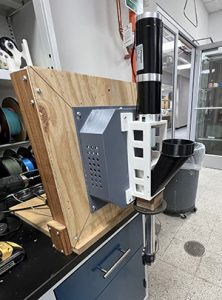The AEST department has been investigating uses for recycled, single-use plastics from around campus. In partnership with the Sustainability Club, the Society of Manufacturing Engineers (SME) has worked to collect, clean, shred, and sort various plastics and implement them in new and useful ways. This has led to a variety of interesting and useful student-produced tooling and products such as keychains, frisbees, and flower pots. This academic year, an offshoot of the recycled plastics program began a new project centered around the idea of creating 3D printing filament.
The project, named Marauder Eco-filament is a collaborative research project where AEST faculty and students work together to investigate and innovate on existing, open-source filament production systems. One of the goals of this project is to develop a working extrusion system that has the capability to use the shredded, recycled plastic and reliably create 3D print materials from it. To that end, AEST students Ashla Durbin and Alex Nikkanen have created two proof of concept systems, one that uses shredded materials and another that uses intact two-liter soda bottles to create filament. These systems have been produced and are being iterated upon by Ashla and Alex to optimize their designs for more consistent products and ease of construction.
Upon completion of the systems, the second phase of the project will begin. Dissemination is a key aspect of any project and as such the Marauder Eco-filament team will take a multifaceted approach to sharing the work. One dissemination strategy is sharing through the academic community. Our team aims to presenting our work at Made in Millersville as well as producing several academic articles designed to suit the 3D printing and education communities. Additionally, plans for the systems will be drafted and shared with the 3D printing community. The spirit of open-source sharing is a foundational component to this work and our initial designs were sourced in the 3D printing community. Given this, the Marauder Eco-filament team is committed to sharing our knowledge and findings with those who can best use and innovate on them as we have done.
We encourage folks to stop by the production area and learn more about our recycled plastics program, the Marauder Eco-filament project, and the wide variety of manufacturing-related labs and activities we offer in Osburn Hall. We would also like to thank our Ashla and Alex for their continued hard work, Dr. Dominick Manusos for his work with the recycled plastics program, and Millersville University for their support of this project.
By: Dr. Alex Johnson and Dr. Justin Egresitz



Commentaires